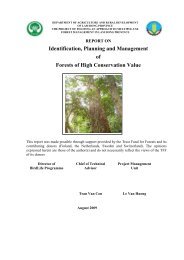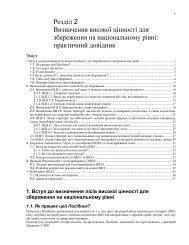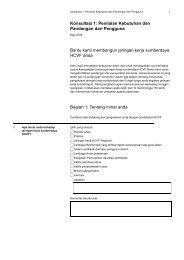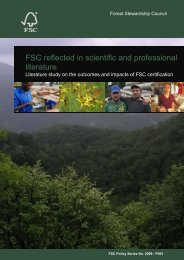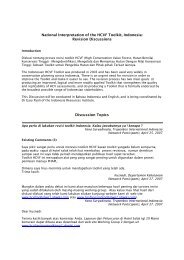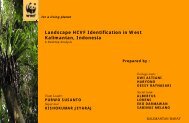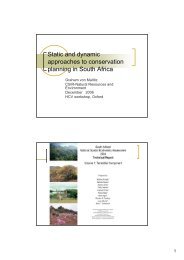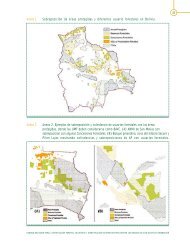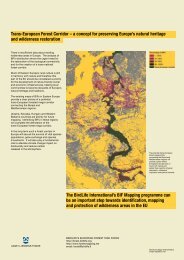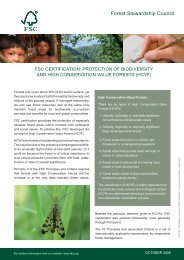Forests Sourcebook - HCV Resource Network
Forests Sourcebook - HCV Resource Network
Forests Sourcebook - HCV Resource Network
Create successful ePaper yourself
Turn your PDF publications into a flip-book with our unique Google optimized e-Paper software.
is reasonable to allow the administration to retain the<br />
revenue from charges it collects from such activities.<br />
Similarly, it is acceptable for forestry administrations to<br />
retain some revenue to cover the costs of administering<br />
the forest revenue system, when the costs of doing so can<br />
be clearly identified and quantified.<br />
Revenue sharing is not a panacea for problems of weak<br />
governance and administration in the forestry sector at the<br />
national level. As with other aspects of fiscal policy in the<br />
forestry sector, any decision to implement revenue sharing<br />
should be based on a robust appraisal of what the problems<br />
are and how revenue sharing might address these problems.<br />
LESSONS LEARNED AND RECOMMENDATIONS<br />
FOR PRACTITIONERS<br />
Based on the lessons learned from countries’ experiences<br />
with fiscal instruments, the following are recommendations<br />
for best practice in this area.<br />
Policy and administration<br />
■<br />
■<br />
■<br />
■<br />
Fiscal policies in the forestry sector should support<br />
forestry policy objectives and the broader objectives of<br />
government. Negative impacts on efficiency and equity<br />
should be minimized.<br />
Fiscal policy reform requires political support and some<br />
degree of consensus and should not be viewed as a purely<br />
technical issue. Open debate and transparency in the<br />
procedures for revising and implementing fiscal policy<br />
are necessary to build this support.<br />
Administration of fiscal instruments should be as simple<br />
as possible and calculation of forest charges should be<br />
based on objective criteria. The need for discretion or<br />
judgment by field staff responsible for assessing and collecting<br />
charges should be minimized.<br />
The general framework for fiscal policies should be established<br />
in primary legislation, but forestry administrations<br />
should be empowered to revise the details of implementation.<br />
Automatic and regular reviews of fiscal instruments<br />
should be implemented according to clearly defined, rigorous,<br />
and objective processes and procedures.<br />
Defining the mixture and level of fiscal instruments<br />
■<br />
Wherever possible, market mechanisms should be used<br />
to establish the levels of charges and incentives rather<br />
than administrative means.<br />
■<br />
■<br />
■<br />
When charges and incentives are set administratively, they<br />
should be based on a rigorous and objective calculation of<br />
costs and benefits. In particular, forest charges should be<br />
based on independent or aggregate information about<br />
forest product prices, and charges levied on individual<br />
operators should not be based on stated prices. Incentives<br />
should be based on the benefits of activities that are being<br />
encouraged rather than their cost.<br />
Incentives should be used to achieve clearly defined<br />
policy objectives; they should be properly targeted and<br />
regularly evaluated. Incentives in the form of direct<br />
transfers will generally be more successful than reductions<br />
in forest charges. Incentives should also be structured<br />
to maximize net benefit and minimize deadweight,<br />
nonadditionality, and displacement.<br />
There is a tradeoff between administrative efficiency and<br />
economic efficiency in fiscal instruments. More complicated<br />
instruments tend to be more economically efficient<br />
but more expensive to administer. Numerous charges<br />
should be avoided (especially where they are levied on<br />
the same item). However, in general, a mixture of different<br />
types of charges may be optimal. Thus, countries<br />
should not rely on volume-based charges alone, but<br />
should consider greater use of area-based charges and<br />
license charges.<br />
Revenue sharing<br />
■<br />
■<br />
In general, hypothecation of forest revenue is not good<br />
practice in public finance and should be avoided. However,<br />
under some specific circumstances it can be justified.<br />
The first is where local people or communities have<br />
clearly defined property rights over some or part of the<br />
forest resource. The second is where the forestry administration<br />
is collecting charges to recoup costs for the provision<br />
of a good or service (which can include the cost of<br />
administering the forest revenue system). In such cases,<br />
revenue sharing should be based on an objective<br />
appraisal of the amount of revenue that should be shared<br />
or retained.<br />
Little evidence supports the hypothesis that revenue<br />
sharing alone will result in improved forest protection by<br />
local communities. In situations where conflict with local<br />
communities is an issue, it may be preferable to devolve<br />
complete responsibility for forest management (including<br />
revenue collection) to local communities. In such<br />
cases, the forestry administration’s role becomes that of a<br />
service provider, to ensure that best practices in revenue<br />
collection and administration are followed.<br />
NOTE 5.4: STRENGTHENING FISCAL SYSTEMS IN THE FORESTRY SECTOR 185




